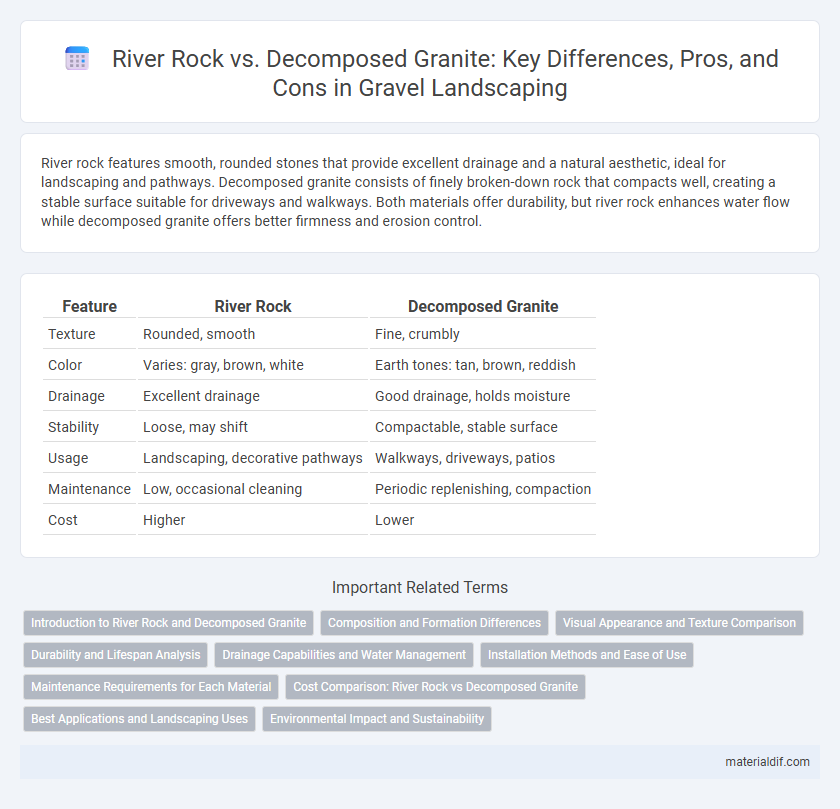River rock features smooth, rounded stones that provide excellent drainage and a natural aesthetic, ideal for landscaping and pathways. Decomposed granite consists of finely broken-down rock that compacts well, creating a stable surface suitable for driveways and walkways. Both materials offer durability, but river rock enhances water flow while decomposed granite offers better firmness and erosion control.
Table of Comparison
| Feature | River Rock | Decomposed Granite |
|---|---|---|
| Texture | Rounded, smooth | Fine, crumbly |
| Color | Varies: gray, brown, white | Earth tones: tan, brown, reddish |
| Drainage | Excellent drainage | Good drainage, holds moisture |
| Stability | Loose, may shift | Compactable, stable surface |
| Usage | Landscaping, decorative pathways | Walkways, driveways, patios |
| Maintenance | Low, occasional cleaning | Periodic replenishing, compaction |
| Cost | Higher | Lower |
Introduction to River Rock and Decomposed Granite
River rock consists of smooth, rounded stones typically collected from riverbeds, known for its natural aesthetic and durability in landscaping projects. Decomposed granite is a weathered, granular material derived from granite rock, offering a compactable and permeable surface ideal for pathways and driveways. Both materials serve functional and decorative purposes, with river rock emphasizing texture and appearance while decomposed granite highlights stability and drainage.
Composition and Formation Differences
River rock consists primarily of smooth, rounded stones formed by natural water erosion in riverbeds, composed mainly of quartz, feldspar, and other durable minerals. Decomposed granite is a weathered, granular material derived from the natural breakdown of granite rock, characterized by its fine particles and sandy texture. These compositional and formation differences influence their texture, durability, and typical landscaping applications.
Visual Appearance and Texture Comparison
River rock showcases smooth, polished surfaces with rounded edges and a variety of natural colors like grays, browns, and blues, creating a visually striking and organic appearance. Decomposed granite features a gritty, coarse texture with a uniform tan or reddish-brown color, providing a more consistent and earthy look. The contrast between river rock's glossy, tactile stones and decomposed granite's fine, loose granules defines their distinct aesthetic and functional appeal in landscaping.
Durability and Lifespan Analysis
River rock offers superior durability due to its smooth, rounded stones that resist erosion, often lasting 15-20 years in landscaping applications. Decomposed granite, characterized by its fine, crumbly texture, typically compacts well but tends to degrade faster, with an average lifespan of 5-10 years under heavy use. Both materials require periodic maintenance, but river rock generally provides longer-lasting performance in high-traffic or water-exposed environments.
Drainage Capabilities and Water Management
River rock features larger, rounded stones that create ample gaps for superior drainage and effective water runoff management in landscaping projects. Decomposed granite, consisting of finer particles, offers moderate drainage while providing better compaction and erosion control on slopes or pathways. Choosing river rock enhances water infiltration and reduces pooling, whereas decomposed granite balances permeability with stability for water management.
Installation Methods and Ease of Use
River rock installation typically requires a well-prepared base with landscape fabric to prevent weed growth and proper edging to keep rocks contained, making it moderately labor-intensive but durable. Decomposed granite (DG) is easier to install due to its fine, compactable texture that allows quick spreading and leveling, often requiring less base preparation and edging. The ease of use of DG makes it suitable for DIY projects, while river rock's heavier stones may need more careful placement and professional installation for stability.
Maintenance Requirements for Each Material
River rock requires minimal maintenance, benefiting from its smooth surfaces that reduce dirt accumulation and resist erosion, making it ideal for pathways and decorative borders. Decomposed granite demands more frequent upkeep, including periodic regrading and replenishment to maintain its compacted surface and prevent washouts. Both materials need occasional debris removal, but decomposed granite's finer texture makes it more susceptible to displacement under heavy foot traffic or rain.
Cost Comparison: River Rock vs Decomposed Granite
River rock typically costs between $120 and $180 per ton, making it a pricier option compared to decomposed granite, which ranges from $60 to $120 per ton. The higher cost of river rock is due to its rounded shape and natural aesthetic appeal, often preferred for landscaping and drainage projects. Decomposed granite offers a more affordable solution for pathways and driveways while providing good compaction and permeability.
Best Applications and Landscaping Uses
River rock offers smooth, rounded stones ideal for water features, drainage areas, and decorative borders, providing a natural look and excellent erosion control. Decomposed granite, with its fine, compacted texture, is perfect for pathways, patios, and driveways due to its stability and ability to form solid surfaces while maintaining permeability. Both materials enhance landscaping aesthetics, but river rock excels in moisture-retaining installations, while decomposed granite suits high-traffic, structural applications.
Environmental Impact and Sustainability
River rock is a natural, non-toxic material that requires minimal processing, making it environmentally friendly with low carbon emissions during extraction and transportation. Decomposed granite, composed of weathered granite fragments, is locally sourced in many regions, reducing transportation impact, but its finer particles may contribute to erosion if not properly stabilized. Both materials offer sustainable landscaping options, though river rock's longevity and recyclability often result in a lower overall environmental footprint.
River Rock vs Decomposed Granite Infographic

 materialdif.com
materialdif.com